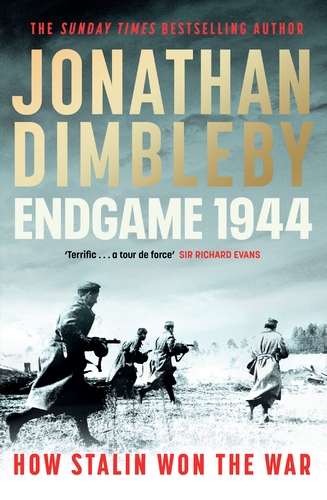Endgame 1944

A gripping and authoritative account of the year that sealed the fate of the Nazis, from the bestselling historian
June 1944: In Operation Bagration, more than two million Red Army soldiers, facing 500,000 German soldiers, finally avenged their defeat in Operation Barbarossa in 1941. The same month saw the Allies triumph on the beaches of Normandy, but, despite the myths that remain, it was the events on the Eastern Front that sealed Hitler’s fate and destroyed Nazism.
In his new book, bestselling historian Jonathan Dimbleby describes and analyses this momentous year, covering the military, political and diplomatic story in his evocative style. Drawing on previously untranslated German, Russian and Polish sources, we see how sophisticated new forms of deception and ruthless Partisan warfare shifted the Soviets’ fortunes, how their triumphs effectively gave Stalin authority to occupy Eastern Europe and how it was the events of 1944 that enabled Stalin to dictate the terms of the post-war settlement, laying the foundations for the Cold War . . .
‘One of the strengths of this book is the line it draws between the awful then of 1944 and the grim events of today . . . Endgame 1944 is thus as much a primer for the present as it is sound history’ – Patrick Bishop, Telegraph
‘Pacily written . . . The detail is terrific, and the extracts from diaries, letters and so on make an indelible impression. The description of the last months of the war in Budapest is a tour de force.’ – Sir Richard Evans, author of The Third Reich in History and Memory
‘Dimbleby has unearthed some powerful voices to producing an engaging mix of the familiar and the new. Fascinating stuff.’ – Roger Moorhouse, author of The Forgers
‘Magnificent . . . draws on so much good material.’ – Dr David Stahel
‘Extraordinary . . . Dimbleby paints a unique picture of the vast, unremitting living hell that was the Eastern Front in the final full year of the war.’ – Frederick Taylor, author of Dresden: Tuesday, 13 February, 1945
‘Endgame 1944 paints a vivid picture of the fighting at both the bayonet end and at high command, but rightly probes the complex relationship between Churchill, Roosevelt and Stalin, powered by different and incompatible visions of the purpose of victory.’ – Allan Mallinson, author of Country Life
